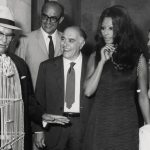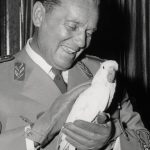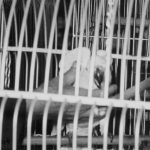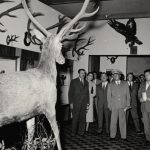Koki, Ciao
TITLE
Koki, Ciao
DIRECTOR
Quenton Miller
COUNTRY
Netherlands
YEAR
2025
DURATION
11′
GENRE
Documentary
Overview
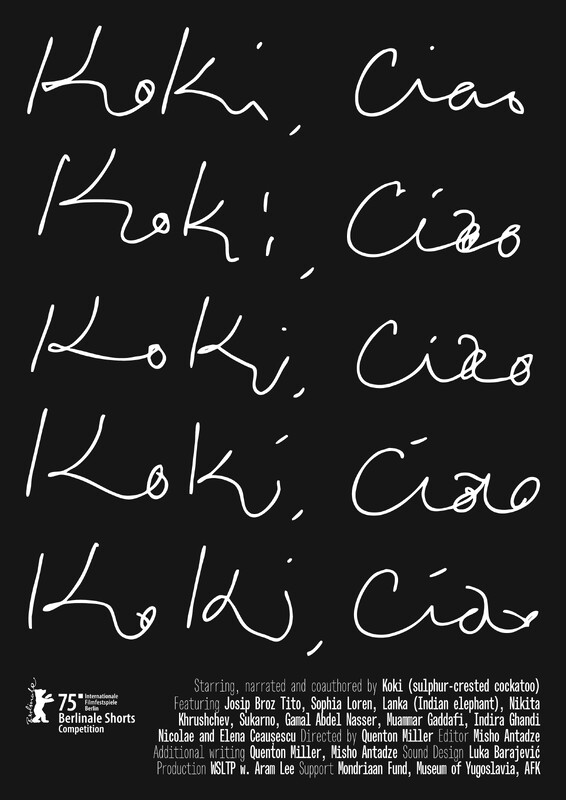
Koki, Ciao
The autobiography of Koki, an immortal parrot, loyal comrade of Marshal Tito, leader of Yugoslavia for 35 years. Made over 4 years with Koki responding to previously unseen archives, this biopic relives the caged memories of this 68 year speaking bird, who had the honour of meeting Hollywood stars, and bloodthirsty dictators.
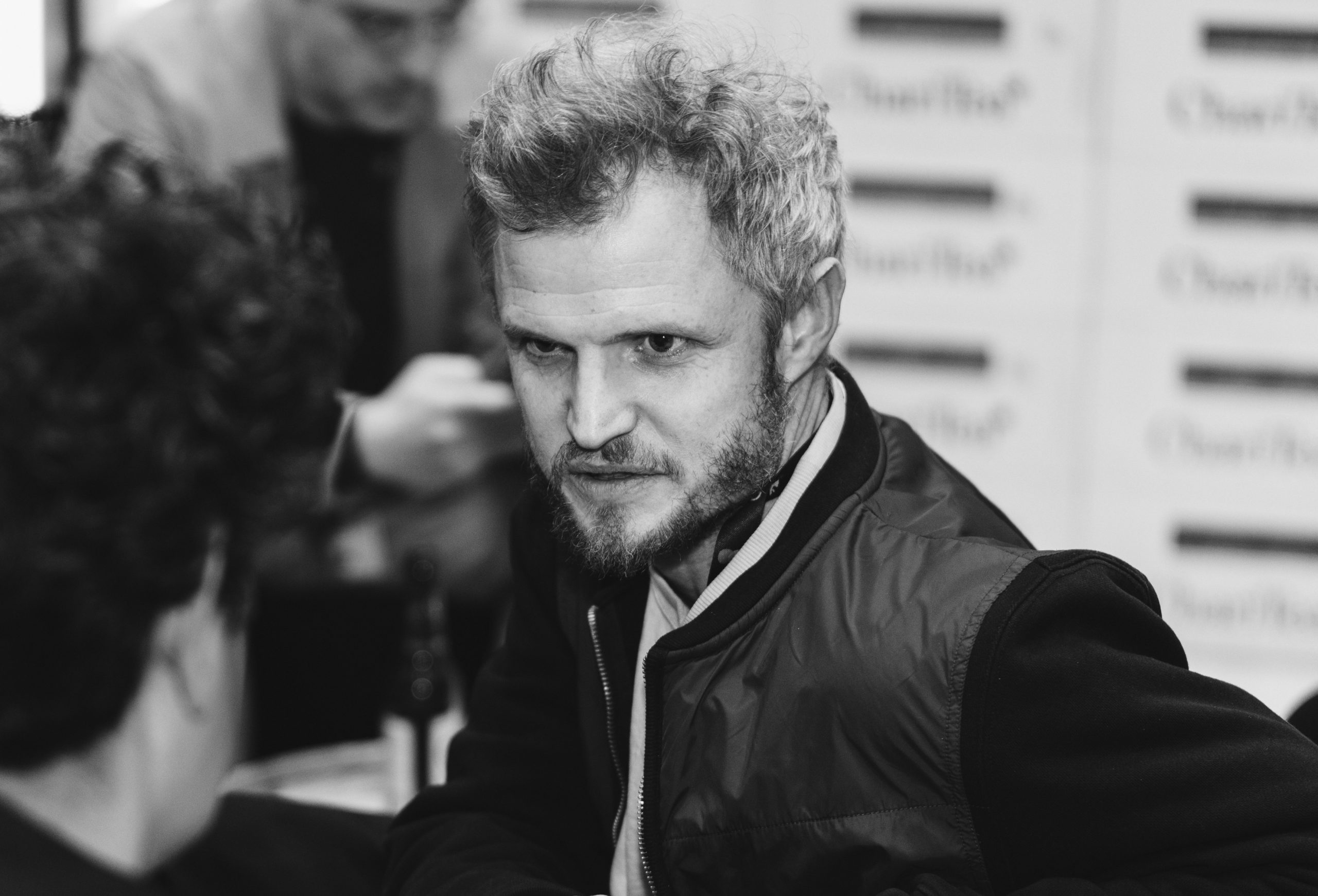
DIRECTOR BIOGRAPHY - Quenton Miller
Quenton Miller (b. Naarm, 1981) is an Australian/UK filmmaker and artist based in the Netherlands since 2012. He studied at Van Eyck Academy and the Master of Artistic Research programme at KABK Den Haag, where his focus on film developed out of playfully disori- entating video installations, as well as writing and designing for literary publications. He usually makes comedic work, depicting alienated characters struggling with language, truth, time and history. His work looks at diverse experiences of language and dislocating experiences of the world, often repurposing documentary and realism with frameworks and modes of address from literature, sci-fi and comedy. “Although Quenton Miller’s work may seem ironic at times” one reviewer wrote “it is characterised by a romanticism and razor-sharp lightness.” Older works include The Trial (2021), a docufiction made with investigators at the International Criminal Court in the Hague looking towards Africa, Dying Marxists (2018) for the Athens Biennale, and The Confidence Man, His Masquerade (2015) an adaption of Herman Melville’s final novel of characters without bearings. He has shown work at IFFR, the Athens Biennale, the Stedelijk Museum Bureau Amsterdam and Apexart New York and published in the Believer and Guernica. With Aram Lee he co-founded When Site Lost the Plot, an art organization “dedicated to exploring the topography of site-specific identity through film and media” as well as the collective the Department of Speculative Facts, which looks at speculative approaches in documentary. “The more unreflective formats of documentary – especially nature documentaries no longer seem like a good orientation in the terminal time of the anthropocene. I try to merge documentary research with the literary side of art films, as well as pun- based comedies, aliens, anime, and the mind-bending word-image and space-time rela- tions from experimental comics and cartoons.”
Credits
- DirectorQuenton Miller
- ScreenplayQuenton Miller
- CinematographyQuenton Miller
- CastJosip Broz Tito, Sophia Loren, Lanka (Indian elephant), Nikita Khrushchev, Sukarno, Jovanka Broz, Muammar Gaddafi, Indira Ghandi, Carlo Ponti, Gamal Abdel Nasser, Nicolae and Elena Ceaușescu
- EditingMisho Antadze
- Producer/s Aram Lee
- Production Company
- Distributor/s
- Project TitleKoki, Ciao
- Project TypeDocumentary
- Completion Date1 January 2025
- Country of originNetherlands
- Country of filmingNetherlands
- LanguageCroatian
- First-time Filmmaker No
- Student ProjectNo

Quenton Miller
Quenton Miller (b. Naarm, 1981) is an Australian/UK filmmaker and artist based in the Netherlands since 2012. He studied at Van Eyck Academy and the Master of Artistic Research programme at KABK Den Haag, where his focus on film developed out of playfully disori- entating video installations, as well as writing and designing for literary publications. He usually makes comedic work, depicting alienated characters struggling with language, truth, time and history. His work looks at diverse experiences of language and dislocating experiences of the world, often repurposing documentary and realism with frameworks and modes of address from literature, sci-fi and comedy. “Although Quenton Miller’s work may seem ironic at times” one reviewer wrote “it is characterised by a romanticism and razor-sharp lightness.” Older works include The Trial (2021), a docufiction made with investigators at the International Criminal Court in the Hague looking towards Africa, Dying Marxists (2018) for the Athens Biennale, and The Confidence Man, His Masquerade (2015) an adaption of Herman Melville’s final novel of characters without bearings. He has shown work at IFFR, the Athens Biennale, the Stedelijk Museum Bureau Amsterdam and Apexart New York and published in the Believer and Guernica. With Aram Lee he co-founded When Site Lost the Plot, an art organization “dedicated to exploring the topography of site-specific identity through film and media” as well as the collective the Department of Speculative Facts, which looks at speculative approaches in documentary. “The more unreflective formats of documentary – especially nature documentaries no longer seem like a good orientation in the terminal time of the anthropocene. I try to merge documentary research with the literary side of art films, as well as pun- based comedies, aliens, anime, and the mind-bending word-image and space-time rela- tions from experimental comics and cartoons.”




